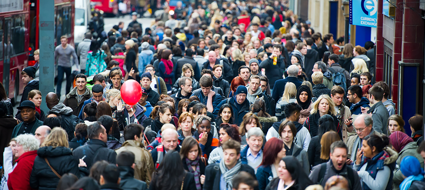‘…together let’s unleash the superpower of community’
Refugee Week website
Inaugurated by the United Nations, World Refugee Day is held each year to recognise and honour refugees worldwide. It aims to build awareness and understanding of refugees, encouraging communities to welcome people seeking sanctuary and offer them support.
The day was created to commemorate the 50th anniversary of the 1951 Convention Relating to the Status of Refugees. This important multilateral treaty builds on Article 14 of the 1948 Universal Declaration of Human Rights. This recognises the right of people to seek asylum from conflict and persecution. It defines who is a refugee, together with the rights of individuals granted asylum.
Organised around the day is Refugee Week. The first Refugee Week event was a street parade and community activities in Sydney in 1986. Established in 1998 in the UK, Refugee Week has grown into a global movement in over 100 countries. It is described as ‘the world's largest community-powered festival with arts and culture at its heart celebrating the contributions, creativity and resilience of refugees and people seeking sanctuary’.
Following decades of research, it is now widely understood how the arts, culture and multilingual learning all play a vital role in facilitating integration and wellbeing. For this to work, such measures must be reciprocal with people sustaining their own identities in host countries, sharing stories and cultural practices through creativity and artistic expression. In the words of Professor Alison Phipps:
Good integration is not camps, it’s not aid, it’s people living in flourishing communities where everyone can contribute.
Professor Alison Phipps
Communities are truly enriched by the diversity of experiences, learning, shared cultures and friendships that characterise Refugee Week. As welfare services struggle to respond to the challenges confronting refugees in terms of housing needs, potential destitution, racial discrimination and health inequalities, it is important to recognise how people might be sustained by mobilising community resources grounded in the arts, theatre, music, dance, food, faith groups, sports, and related activities. In itself Refugee Week can be a crucial gateway for so many, bringing people together.
The theme of this year’s Refugee Week is ‘Community as a Superpower’. This is emphasised in a quote by bell hooks, American author and activist:
We can begin the process of making community wherever we are. We can begin by sharing a smile, a warm greeting, a bit of conversation; by doing a kind deed or by acknowledging kindness offered to us.
bell hooks
The Refugee Week website explains why the term ‘refugee’ is used together with a caveat about how people might choose to define themselves. For me, a striking and welcoming alternative can be found in Scotland where people who have been forcibly displaced or are deemed to have a well-founded fear of persecution are called ‘New Scots’. The latest New Scots Refugee Integration Strategy is founded on six principles. Three of which especially summarise what we should all seek to achieve during Refugee Week and beyond:
- Include people with lived experience in planning and implementation.
- Support local communities to welcome New Scots.
- Collaborate across various groups: local councils, politicians, charity and grassroots organisations, health boards, schools.
In a recent study of the experiences of Eritrean refugees, participants commented on ‘radical acts of kindness’ on the part of UK council workers. Noting ‘she was like my sister’ or ‘he was like my dad’ – especially significant for people without family in the UK.
Practitioners in adult social care are well placed to begin that process of making community with such simple acts of kindness, independent of resource constraints. In many instances the relationships that develop become the service, characterised by trust, reciprocity and ultimately hope.
While it might seem less evident in many regions of the UK currently, community social work has always been regarded as one of the pillars of the profession, alongside casework and group work, culminating in the Barclay Report 1982, which commended community engagement and fostering community resilience.
Focused on connection, partnership, collaboration and social justice, the principles of community social work continue to find expression in social care initiatives such as co-production and local area coordination. Social work is well placed to grow communities and foster community approaches in the knowledge that communities are living and dynamic rather than defined and constrained by nationality, for example, or geographical boundaries. Growing communities becomes a process rather than a product realised through the ‘incredible everyday… simple acts of shared generosity’.






